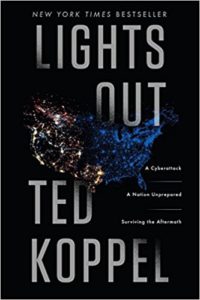Lights Out: A Cyberattack, A Nation Unprepared, Surviving the Aftermath
by Ted Koppel, 2015
The first thing that interested me about the electric grid was the question of its resiliency and protecting it from attack. While my academic research has mostly focused on economic questions, the topic of resiliency is still interesting to me. Koppel’s book discusses the possibility of losing control of the electric grid due to a cyberattack and urban areas having to cope with a loss of power for weeks or months.
Generally speaking, the US seems unprepared for a cyberattack. Assuming the government was not protecting a classified plan, they did not have a plan to share with Koppel for how to deal with a prolonged grid outage. It is unlikely that the government will provide food, water, and basic supplies if an outage exceeds a few days. The alarming part is how unprepared for this outcome most city dwellers seem to be.
About half of the book discusses the disaster preparation plans of more prepared people. While this was, by itself, interesting, it was a little far from discussing the resiliency of the grid. I would have preferred this section to be shorter. Few, if any, of the preppers were focused on an extended grid outage.
It is interesting (ironic?) that we are more connected than ever due to the internet, but in the event of an electric outage, we will be less connected than ever. There needs to be operational plans in place for how to handle an extended outage, and these plans should be communicated BEFORE the outage, as there will be little ability to communicate them after the outage. Seems like a good outlet for operations management and risk management.
I listened to this book on tape.
